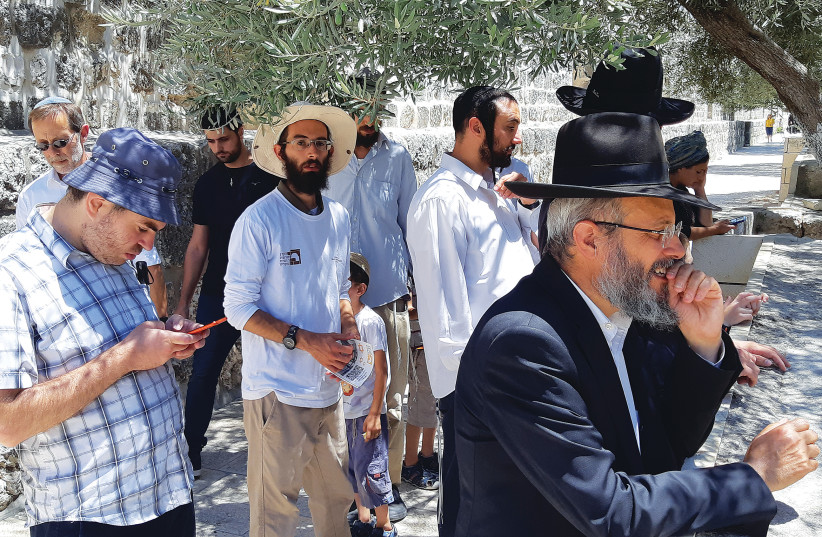50% of Jewish Israelis support Jewish prayer at the Temple Mount, while 40% are against such prayer, according to a new poll by the Viterbi Center for Public Opinion and Policy Research of the Israel Democracy Institute (IDI) published on Tuesday.
A larger majority of Likud, Religious Zionist, Yamina, New Hope and Yisrael Beytenu voters support Jewish prayer at the site, ranging between 65% to 75.5%.
Most of the respondents who supported Jewish prayer at the Temple Mount stated that they did so because it would clarify the Jewish sovereignty at the site. Those against Jewish prayer at the site mostly stated that they were opposed because it could cause a severe response from the Islamic world.
Only 17% of respondents stated that the main reason they were opposed to Jewish prayer at the site is that they believe it is forbidden due to Jewish law and only 12% stated that the main reason they support such prayer is that it is a commandment.
The IDI poll found that most of the respondents who identified as Haredi (86.5%) were opposed to Jewish prayer at the Temple Mount due to Jewish law. About 70% of the religious, traditional observant and traditional non-observant respondents supported Jewish prayer at the site, while only 42% of secular respondents expressed support.

Jewish religious (Halachic) authorities have heavily debated throughout the past century whether Jews can visit the Temple Mount due to laws concerning ritual impurity and a lack of clarity about the exact boundaries of the biblical Temple Mount. Those who are ritually impure are prohibited according to Jewish law from entering the bounds of the Temple Mount where the First and Second Temple stood, which is only a portion of the larger plaza commonly referred to today as the Temple Mount or Haram al-Sharif.
Noticeable Jewish prayer remains prohibited at the site
While the High Court of Justice has ruled in the past that Jews do have the legal right to pray on the Temple Mount, police have cited security concerns to impose a blanket prohibition on Jewish prayer. Israel Police reiterated on Wednesday that regulations concerning Muslim and Jewish prayer at the site had not changed and were not expected to change soon.
The Waqf, an arm of the Jordanian Ministry of Sacred Properties, administers the Temple Mount site.
Jewish visitors to the site are informed upon entry that prayer and religious items such as prayer books or prayer shawls or forbidden in the complex, although, since late 2019, Jewish visitors have been able to pray quietly, in certain parts of the site, relatively undisturbed.
Jewish visitors walk on a set path circling the raised plaza where the Dome of the Rock is located while accompanied by police and Waqf representatives. Those seen openly praying or prostrating are often removed from the site.
Temple Mount to reopen to Jewish visitors after nearly two weeks
Israel Police confirmed on Tuesday that the Temple Mount is expected to reopen to Jewish visitors on Thursday, as Israel marks Independence Day, although this is dependent on situation assessments.
The Temple Mount has been closed to Jewish visitors since April 22.
Palestinian media published reports on Tuesday claiming that Jewish visitors to the site planned to carry Israeli flags and sing the Israeli national anthem on the Temple Mount.
Hamas Spokesperson Abdel Latif Al-Qanou warned that if Jews were allowed to enter the site on Thursday, it would be a "detonator for a new confrontation" with Israel. The spokesperson called on Arabs and Palestinians to arrive at the Temple Mount to confront the Jewish visits.
Israelis pessimistic about the security situation
Concerning the future of the security situation in Israel, only about a third (38%) of respondents expressed optimism about the future of the situation, compared to about 50% in April last year.
The percentage of respondents expressing optimism about the future of the security situation did in the past month though (from 29% to 38%), despite a series of terrorist attacks and tensions in Jerusalem, the West Bank and Gaza. The IDI report stated that this could be a sign of the satisfaction of some parts of the public with how the situation is being handled.
Only a third of Jewish Israelis rated Prime Minister Naftali Bennett's handling of the security situation as good, while 42% rated it poorly. Arab-Israelis gave an even lower rating, with only 16% saying Bennett handled the situation well.
Meanwhile, over half of Jewish respondents rated the handling of the situation by the police as good, while only 20% rated the police's handling of the situation badly. Among Arab-Israelis, the situation was much different, with 70% saying the police handled the situation badly.
62% of Jewish respondents expressed dissatisfaction with the way Ra'am handled the situation, while 76% rated the Joint List badly. Meanwhile, 52% of Arab-Israeli respondents rated Ra'am's handling of the situation badly and 47% rated the Joint List badly.
